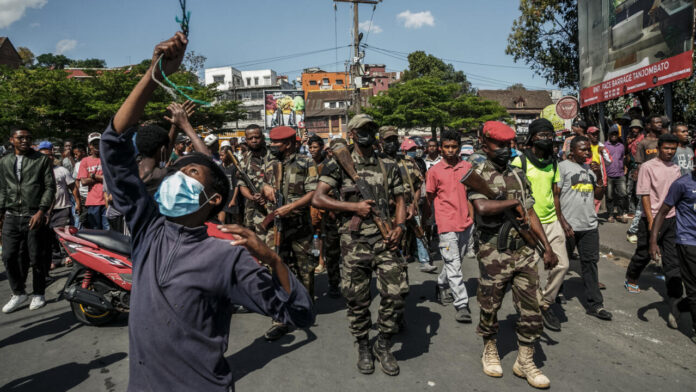In a dizzying sequence of events, the situation in Madagascar escalated rapidly. Addressing the country on national radio Tuesday, military leader Colonel Michael Randrianirina declared the military had “taken power”. He added that it was dissolving all institutions except the lower house of parliament, which a short time earlier had voted to impeach President Andry Rajoelina for desertion of duty after he fled the country on Monday.
A spokesperson for the African Union on Wednesday said that the bloc had suspended Madagascar with immediate effect following the military’s takeover, saying, “The rule of law must prevail over the rule of force.”
Weeks of unprecedented protests spearheaded by Gen Z Madagascar, a movement born on social media, set the scene for the spiralling political crisis the island is now facing. Demonstrations that first erupted on September 25 over widespread water and power outages quickly intensified. Thousands of young protesters took to the streets of the capital Antananarivo, their phone flashlights held high, railing against corrupt institutions and the extreme poverty that plagues a large part of Madagascar’s population.
The situation took a turn last weekend, when President Rajoelina warned that an “attempt to seize power illegally and by force” was under way. Meanwhile, Randrianirina’s elite CAPSAT (Corps d’armée des personnels et des services administratifs et techniques) military unit, which had played a key role in bringing Rajoelina to power in a 2009 coup, joined the protesters in the centre of the Madagascan capital and said they would disobey shoot-to-kill orders.
Read moreWho is Michael Randrianirina, the colonel who toppled Madagascar’s president?
It is not the first time that Madagascar has been mired in political upheaval.
Since gaining independence from France in 1960, the country has experienced a series of similar crises. Students overthrew former president Philibert Tsiranana’s pro-French regime in the name of social justice in 1972. Civil service strikes and protests in 1991 once again forced the president at the time to resign, but the fledgling democracy was hampered by the return of the same elites. Charismatic entrepreneur Marc Ravalomanana came to power in 2002 with dreams of a modern, open country. But in 2009 he was swept from power by Rajoelina, a former DJ who had risen through the political ranks to become the young mayor of Antananarivo.
Empty promises
Now Rajoelina, controversially re-elected in 2023 amid an opposition boycott, has abandoned the presidency in much the same way as his predecessor – reportedly aboard a French plane.
“Regime after regime promises they will put an end to disorder, but winds up being the cause of it,” says Arnaud Léonard, a historian specialising in Madagascar’s history. “Every president promises to be a saviour, and every generation takes to the streets to chase them out. The only thing that has changed is that slogans used to be printed on leaflets, and now they are spread on social media. But the anger is very much the same.”
Once again, that anger is being fuelled by the increasingly unbearable social and economic conditions the nation faces. Madagascar is still one of the poorest countries in the world, despite the 4.2 percent growth its economy saw in 2024 – a paradox that became even less palatable after Rajoelina promised to “improve the daily lives of the population”, “increase wages” and “combat poverty”.
One of your browser extensions seems to be blocking the video player from loading. To watch this content, you may need to disable it on this site.

Rajoelina’s promises turned out to be empty. Seized by corruption and capital flight, Madagascar’s economy offers very few prospects to its population, whose median age is 20. As basic infrastructure began to break down, young Madagascans had had enough.
“Against this backdrop, water and power shortages fuelled outrage that pushed political mistrust to its limit. The connection between the people [of Madagascar] and its politics was already fraught, but now it is completely destroyed,” says Christiane Rafidinarivo, associate professor of political science at Sciences Po university in Paris.
For Denis-Alexandre Lahiniriko, a historian and senior lecturer at the University of Antananarivo, these recurrent political crises can be traced back to the alienation that exists between the Madagascan state and its people. “Madagascar has never succeeded in creating a socio-political structure its population identifies with,” he explains.
Gen Z on the front lines
During the latest demonstrations, the military intervened to stop police from cracking down on protesters, says Rafidinarivo. “They reshuffled the chain of command to ensure things didn’t [escalate] after the police and military fired on each other on Saturday,” she says.
Back in 1991 the military also played a key role, forcing politicians to reach a consensus and end the crisis. But this time around, it was young people who took to the front lines to hold the state accountable. “What is new about this generation is how connected to the world it is thanks to social media. It can compare what is happening elsewhere by going online. And unlike previous generations, young people today have not been politically censored. Their slogan is, ‘We are rising up for our children’s land.’ They want change,” says Rafidinarivo.
For his part, Lahiniriko thinks the demands put forth by the Gen Z movement – like changing the way Madagascar is governed – are not based on concrete plans. “The movement was inspired by crises it saw on social media, like what was happening in Nepal [and Morocco]. But we must not forget that having electricity and running water is already a privilege most young Madagascans don’t have,” he says.
Read moreGeneration Z is stirring up rebellion across borders, from Morocco to Madagascar
Lahiniriko says that, without a strong leader or comprehensive ideology, the movement will likely dissipate quickly. “It’s too early to say, but the political elite could simply return to power,” Lahiniriko says.
Thousands of protesters gathered on the capital’s 13 May Square on Tuesday, dancing, singing and waving banners. Colonel Randrianirina took the stage at one point and asked: “Are you ready to accept a military takeover?” and the crowd cheered.
As news of the takeover made its way among the protesters, many were jubilant.
“We’re so happy Andry Rajoelina is finally gone … We will start again,” high-school student Fih Nomensanahary told Reuters, with four of her friends cheering alongside her.
Others were more cautious. “They need to hand over to a civilian administration quickly and have an election,” said Rezafy Lova, a 68-year-old IT consultant.
This article was translated from the original in French by Lara Bullens.
Source link






